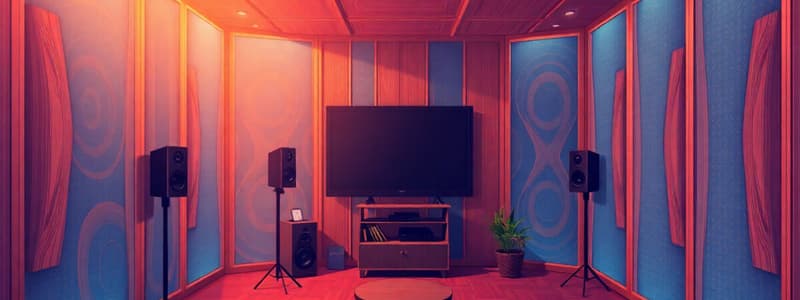Podcast
Questions and Answers
Wallace started graduate school at Harvard after obtaining his undergraduate degree from Ohio State.
Wallace started graduate school at Harvard after obtaining his undergraduate degree from Ohio State.
True (A)
While studying at Harvard, Wallace primarily focused on electricity research.
While studying at Harvard, Wallace primarily focused on electricity research.
True (A)
Wallace used a device similar to a microphone to measure sound levels in various buildings on campus.
Wallace used a device similar to a microphone to measure sound levels in various buildings on campus.
False (B)
Wallace and his students worked overnight to minimize noise interference from other students.
Wallace and his students worked overnight to minimize noise interference from other students.
Wallace used cushions from Sanders Theatre to test the impact of different materials on sound decay in the Fogg Museum.
Wallace used cushions from Sanders Theatre to test the impact of different materials on sound decay in the Fogg Museum.
Wallace’s research on room acoustics led him to discover the mathematical correlation between room size, surface material, and the reverberation time.
Wallace’s research on room acoustics led him to discover the mathematical correlation between room size, surface material, and the reverberation time.
University president Charles William Elliot allowed Wallace to continue his research for two years before making him fix the Fogg Museum’s acoustics.
University president Charles William Elliot allowed Wallace to continue his research for two years before making him fix the Fogg Museum’s acoustics.
Reverberance refers to the duration of sound persistence in a room after the sound source is stopped.
Reverberance refers to the duration of sound persistence in a room after the sound source is stopped.
In a large room, a single impulse sound may pass a listener 8,000 times per minute after it is abruptly stopped.
In a large room, a single impulse sound may pass a listener 8,000 times per minute after it is abruptly stopped.
The impulse response can be considered an acoustical fingerprint of a room.
The impulse response can be considered an acoustical fingerprint of a room.
Reverberation time can be derived by fitting a random line to the decay rate of an impulse response.
Reverberation time can be derived by fitting a random line to the decay rate of an impulse response.
A strong late reflection on a graph indicates a pronounced echo.
A strong late reflection on a graph indicates a pronounced echo.
Good speech intelligibility requires the same room characteristics as good music listening.
Good speech intelligibility requires the same room characteristics as good music listening.
The Fogg Art Museum's lecture hall was originally functional and allowed clear speech.
The Fogg Art Museum's lecture hall was originally functional and allowed clear speech.
Comparing two impulse responses can help identify troublesome reflections in a room.
Comparing two impulse responses can help identify troublesome reflections in a room.
Wallace Clement Sabine's mother played a significant role in his early education.
Wallace Clement Sabine's mother played a significant role in his early education.
The human auditory system excels at differentiating bass tones below 250 Hz.
The human auditory system excels at differentiating bass tones below 250 Hz.
Higher clarity indices indicate poorer sound clarity.
Higher clarity indices indicate poorer sound clarity.
Reverberance and clarity in concert halls are typically positively related.
Reverberance and clarity in concert halls are typically positively related.
Coupled-volume concert halls aim to resolve the conflict between clarity and reverberance by using doors to control sonic transparency.
Coupled-volume concert halls aim to resolve the conflict between clarity and reverberance by using doors to control sonic transparency.
In a coupled-volume concert hall, late-arriving energy that leaks back into the audience is always quieter than the sound that remains in the main part of the hall.
In a coupled-volume concert hall, late-arriving energy that leaks back into the audience is always quieter than the sound that remains in the main part of the hall.
The impulse response of a coupled-volume concert hall typically decays rapidly at first and then more slowly.
The impulse response of a coupled-volume concert hall typically decays rapidly at first and then more slowly.
Each note in a coupled-volume concert hall is expected to linger long enough to ensure clarity but not reverberance.
Each note in a coupled-volume concert hall is expected to linger long enough to ensure clarity but not reverberance.
Audiences generally prefer rooms with high clarity for unamplified music performances.
Audiences generally prefer rooms with high clarity for unamplified music performances.
Reliable absorption coefficient values for the 63-Hz octave band are easily measurable in laboratories.
Reliable absorption coefficient values for the 63-Hz octave band are easily measurable in laboratories.
Sabine's formula is most accurate in very absorptive rooms.
Sabine's formula is most accurate in very absorptive rooms.
The optimal reverberation times are specified for all possible uses of a room.
The optimal reverberation times are specified for all possible uses of a room.
For unamplified music listening, low-frequency reverberation times should be shorter than mid-frequency values.
For unamplified music listening, low-frequency reverberation times should be shorter than mid-frequency values.
Clarity in acoustics refers to the differentiation of each syllable and musical note.
Clarity in acoustics refers to the differentiation of each syllable and musical note.
Rooms with high reverberation times generally have a richness of clarity.
Rooms with high reverberation times generally have a richness of clarity.
The human brain can combine direct sound with early sound reflections to enhance clarity.
The human brain can combine direct sound with early sound reflections to enhance clarity.
Upholstered seats do not contribute to the absorption coefficient in a room design calculation.
Upholstered seats do not contribute to the absorption coefficient in a room design calculation.
A coupled volume must be less reverberant than the main concert hall.
A coupled volume must be less reverberant than the main concert hall.
The doors linking the coupled volume and the main room must allow for a significant gap for sound to leak through.
The doors linking the coupled volume and the main room must allow for a significant gap for sound to leak through.
Rooms with large concrete coupled volumes typically perform better in terms of acoustics.
Rooms with large concrete coupled volumes typically perform better in terms of acoustics.
A fully closed door condition allows the room to behave like a standard concert hall without a coupled volume.
A fully closed door condition allows the room to behave like a standard concert hall without a coupled volume.
The aperture size required for a double-slope decay is generally close to halfway open.
The aperture size required for a double-slope decay is generally close to halfway open.
If the doors are opened to 3%, the double-slope may dissipate into a response similar to when doors are fully opened.
If the doors are opened to 3%, the double-slope may dissipate into a response similar to when doors are fully opened.
Background noise in coupled-volume concert halls should be kept relatively high.
Background noise in coupled-volume concert halls should be kept relatively high.
Musicians and critics can recognize many coupled-volume concert halls with audible double-slope decays.
Musicians and critics can recognize many coupled-volume concert halls with audible double-slope decays.
Limiting background noise is less important in coupled‐volume concert halls compared to traditional venues.
Limiting background noise is less important in coupled‐volume concert halls compared to traditional venues.
Variable acoustics can allow for a room's acoustic quality to be adapted for specific musical pieces.
Variable acoustics can allow for a room's acoustic quality to be adapted for specific musical pieces.
Reverberation Time Calculation requires accounting for every surface in a room without exception.
Reverberation Time Calculation requires accounting for every surface in a room without exception.
Retractable sound‐absorbing curtains can be used to adjust a room's reverberation time.
Retractable sound‐absorbing curtains can be used to adjust a room's reverberation time.
Audience presence in a venue has no effect on sound absorptance calculations during rehearsals.
Audience presence in a venue has no effect on sound absorptance calculations during rehearsals.
Sound-reflecting panels and sound-absorbing panels can be used interchangeably without altering the acoustic outcome.
Sound-reflecting panels and sound-absorbing panels can be used interchangeably without altering the acoustic outcome.
The double-slope decay is universally preferred over the single-slope Sabine decay by audiences.
The double-slope decay is universally preferred over the single-slope Sabine decay by audiences.
Triangles used in acoustic design can have sides that are sound reflective, absorptive, or diffusive.
Triangles used in acoustic design can have sides that are sound reflective, absorptive, or diffusive.
Flashcards
Impulse Response
Impulse Response
The unique acoustical signature of a space representing how sound travels and interacts within it based on materials and geometry.
Reverberation Time
Reverberation Time
A measure of how long it takes for sound to decay in a room, influencing clarity and fullness.
Pronounced Echo
Pronounced Echo
A significant echo in a room that can cause distraction and hinder understanding.
Impulse Response Comparison
Impulse Response Comparison
Signup and view all the flashcards
Acoustic Character
Acoustic Character
Signup and view all the flashcards
Speech Intelligibility and Music Listening
Speech Intelligibility and Music Listening
Signup and view all the flashcards
Excessive Reverberance
Excessive Reverberance
Signup and view all the flashcards
Acoustic Tuning
Acoustic Tuning
Signup and view all the flashcards
Reverberance
Reverberance
Signup and view all the flashcards
Room Acoustics
Room Acoustics
Signup and view all the flashcards
Surface Materiality
Surface Materiality
Signup and view all the flashcards
Wallace Clement Sabine
Wallace Clement Sabine
Signup and view all the flashcards
Acoustical Treatment
Acoustical Treatment
Signup and view all the flashcards
Appropriate Reverberation Time
Appropriate Reverberation Time
Signup and view all the flashcards
Designing for Sound Quality
Designing for Sound Quality
Signup and view all the flashcards
Clarity
Clarity
Signup and view all the flashcards
Early Reflections
Early Reflections
Signup and view all the flashcards
Direct Sound and Early Reflections
Direct Sound and Early Reflections
Signup and view all the flashcards
Detailed Octave-Band Resolution
Detailed Octave-Band Resolution
Signup and view all the flashcards
Mid-Frequency Reverberation Time
Mid-Frequency Reverberation Time
Signup and view all the flashcards
Low-Frequency Reverberation Time (Warmth)
Low-Frequency Reverberation Time (Warmth)
Signup and view all the flashcards
Room Acoustics Qualities
Room Acoustics Qualities
Signup and view all the flashcards
Noise Floor
Noise Floor
Signup and view all the flashcards
Variable Acoustics
Variable Acoustics
Signup and view all the flashcards
Reverberation Time (RT)
Reverberation Time (RT)
Signup and view all the flashcards
Coupled-Volume
Coupled-Volume
Signup and view all the flashcards
Double-Sloped Decay
Double-Sloped Decay
Signup and view all the flashcards
Retractable Sound-Absorbing Panels
Retractable Sound-Absorbing Panels
Signup and view all the flashcards
Rotating Triangular Wedges
Rotating Triangular Wedges
Signup and view all the flashcards
Reverberation Time Calculation Checklist
Reverberation Time Calculation Checklist
Signup and view all the flashcards
Clarity (in acoustics)
Clarity (in acoustics)
Signup and view all the flashcards
Reverberation
Reverberation
Signup and view all the flashcards
Double-Sloped Decay (in concert halls)
Double-Sloped Decay (in concert halls)
Signup and view all the flashcards
Early Decay
Early Decay
Signup and view all the flashcards
Late Decay
Late Decay
Signup and view all the flashcards
Sound Leakage
Sound Leakage
Signup and view all the flashcards
Aperture Size
Aperture Size
Signup and view all the flashcards
Background Noise
Background Noise
Signup and view all the flashcards
Study Notes
Room Acoustics
- Room acoustics deals with how sound behaves in enclosed spaces.
- One key concept is the impulse response.
- An impulse sound, like a gunshot, will reflect and echo many times within a large room.
- The impulse response is a graph showing how these sound arrivals change over time
- This represents the acoustical characteristics, such as arrival times and loudness.
- It can reveal acoustic defects in a room.
- Reverberation time is derived from the rate of decay of sound after an impulse.
Room Acoustics Qualities: Impulse Response
- The impulse response presents the arrival time, loudness, reverberance, frequency, content and directionality of sound reflections, revealing acoustic defects within a space.
- This is useful, as it shows how one single sound bounces around within a room.
- The mapping of sound front arrivals over time signifies the impulse response within a room.
Room Acoustics Qualities: Reverberation
- Reverberation refers to the persistence of sound in a room even after the sound source stops.
- It results from reflections and echoes within the room.
- In architecture, more reverberation isn't always desired or avoided.
- The ideal reverberation level depends on the room's intended usage.
- Speech needs less reverberation for clarity, while music often benefits from more for fullness.
- Sabine's formula quantitatively relates room volume, surface area and material absorption to reverberation time.
Room Acoustics Qualities: Clarity
- Clarity is the opposite of reverberation. It relates to distinctness of sound signals like speech syllables or music notes.
- High reverberation can lead to a lack of clarity, while low is conducive to clarity.
- Achieving clarity requires maximizing both the direct sound and the very early reflections.
- The Haas effect describes the integration of early reflections with direct sound, promoting clarity.
- Room shaping helps to maximize the direct sound and minimize unwanted echoes.
Variable Acoustics
- Coupled-volume concert halls try to reconcile reverberation and clarity.
- Sound bouncing between coupled rooms in some venues improves both.
- The door size between rooms significantly impacts the acoustic properties, leading to different reverberation types.
- The aperture size influences the impulse responses.
- Design elements like retractable banners or curtains can adjust reverberation for different performances.
- Acoustic design in coupled spaces demands careful consideration of variables such as geometry, surfaces and materials, to optimize the reverberation and clarity.
Studying That Suits You
Use AI to generate personalized quizzes and flashcards to suit your learning preferences.




